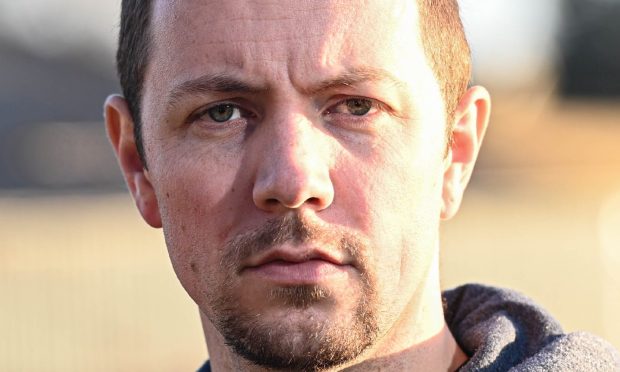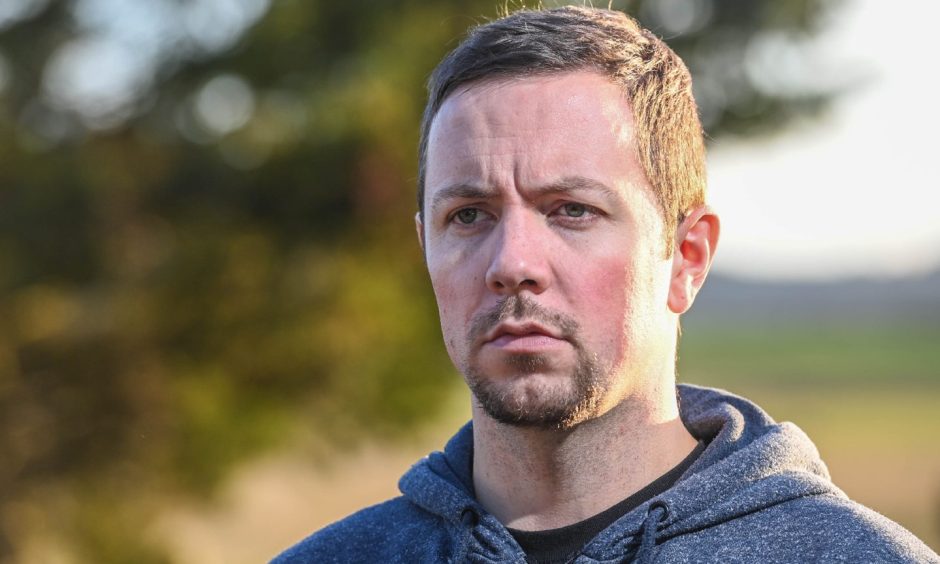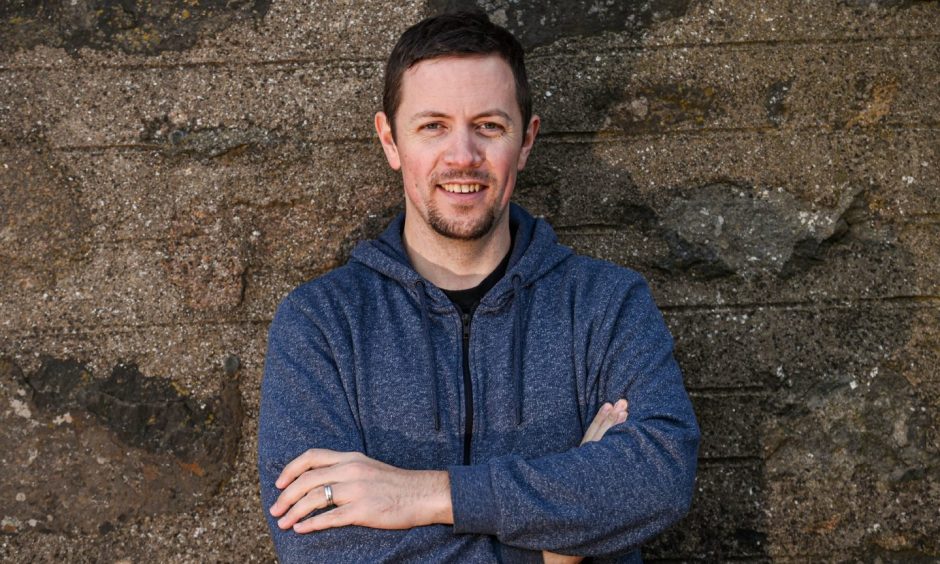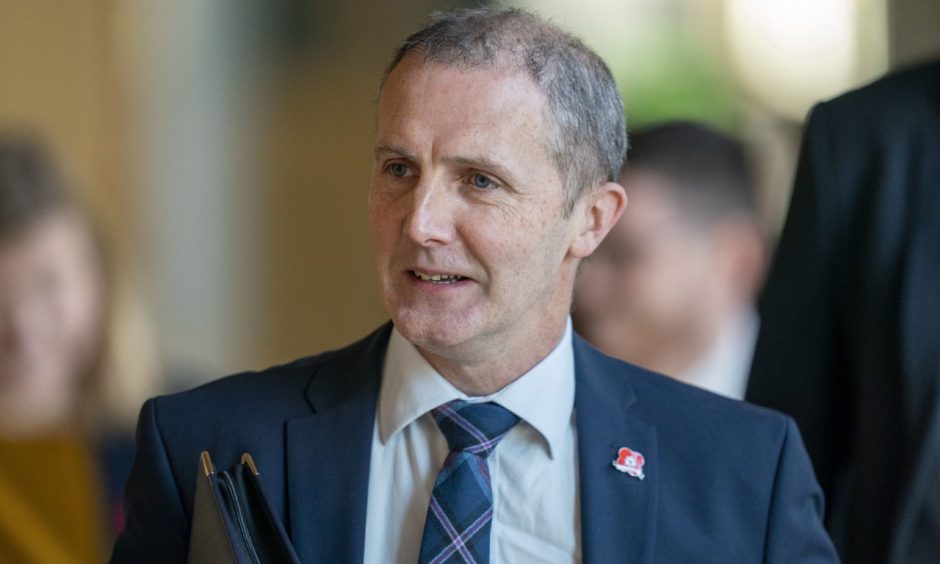A north-east dad fears he came close to suffering life-threatening sepsis after a wait of three and a half years for gall bladder surgery.
Andrew Reid, from Insch, wants to speak out about his experience in the hope of bringing attention to the plight of others still languishing on NHS waiting lists.
Asked about the case at Holyrood, Health Secretary Michael Matheson said he “deeply regrets” Mr Reid had to wait an “extended period of time” for treatment.
The lengthy wait meant that by the time he received the surgery to remove his gall bladder, it had attached to his liver and stomach.
Mr Reid had also developed an infection and believes he narrowly avoided further life-threatening complications like sepsis.
‘Crippling pain’
In an interview with the P&J, the 31-year-old said his problems started in March 2020 just before the country went into lockdown.
“Just before Covid, I was diagnosed with gall stones”, he said.
“I got told it was a case of operate or be on pain pills for the rest of my life.”
Opting to join the waiting list for treatment, Mr Reid would later start to suffer regular gall bladder attacks requiring hospitalisation and time off work.
Working as a lorry driver, the father-of-two became unwell on several occasions while working away from home.
This left him forced to access care at hospitals in Edinburgh, Glasgow and Stirling.
Describing his attacks, he said: “I’d get no warning and it just hits you.
“I was told by a female paramedic that it’s worse than childbirth and a constant pain.
“I’d get crippling pain, nausea and an inability to move.
“I lived in constant fear of ‘what if I lose my job’.”
Surgery setback
Mr Reid was in hospital on Christmas Day last year with an attack and was told surgeons would carry out the operation to remove his gall bladder the following day.
However, he faced another setback after being swabbed and told he had tested positive for Covid before surgery, and that the operation could no longer go ahead.
A few months ago, while still waiting for a date, Mr Reid was back unwell in hospital with jaundice. But it took until late September to get a date for surgery.
Finally, on October 26, 10 months after the first operation date, he went into Aberdeen Royal Infirmary to have the surgery to remove his gall bladder.
But doctors discovered further complications when he was on the operating table.
‘Fortunate I never got sepsis’
Now recovering from the surgery at home in Insch, Mr Reid said: “I was supposed to be an in-patient and in and out in a day.
“When they went in they discovered I had an infection despite numerous blood tests showing nothing.
“The gall bladder had attached itself to my stomach and liver. A 40 minute surgery turned into two hours. I had to spend six days in hospital.”
Since returning home his recovery is going well but he believes he narrowly avoided a worse fate and wants to raise attention of his experience.
“I believe it could have been a lot worse had it been allowed to continue”, he said.
“I was fortunate I never got the stage where I had sepsis.”
Health secretary ‘regrets’ wait
Alexander Burnett, Conservative MSP for Aberdeenshire West, has helped Mr Reid with his case and raised it with the health secretary at Holyrood last week.
In response, Mr Matheson said he “deeply regrets” the length of time for treatment and said the decision in terms of priority is a “clinical decision”.
He pointed to the “significant backlog” of elective surgeries that has developed as a result of the pandemic.
Mr Matheson added: “We are investing an additional £100 million in each of the next three years to ensure that there are sustained reductions in waiting lists across all speciality areas.”
Speaking to the P&J, Mr Burnett said: “The ordeal Andrew went through will resonate with many people who are waiting for life-changing procedures in Scottish hospitals.
“In a properly-resourced NHS, no one would have to tolerate excruciating pain like he did, for a diagnosed condition with a clear solution. Being at the point of developing sepsis, which is a killer illness in its own right, while waiting for treatment is beyond unacceptable.”
What did NHS Grampian say?
An NHS Grampian spokesman said: “We know that waiting times are longer than we would wish and this impacts on patients.
“We apologise to those affected and recognise the impact waits can have on quality of life for patients. NHS Grampian is working hard to reduce waiting times across the region.
“As with all specialties, patients are seen based on clinical need – with those in need of life-saving surgery seen as a priority.
“As a health board we cannot comment on individual patient cases, but would strongly encourage Mr Reid to contact us regarding any concerns.
“When a patient does make direct contact with us we are more than willing to discuss their case with them – including their diagnosis, treatment and any further care they received.”




Conversation